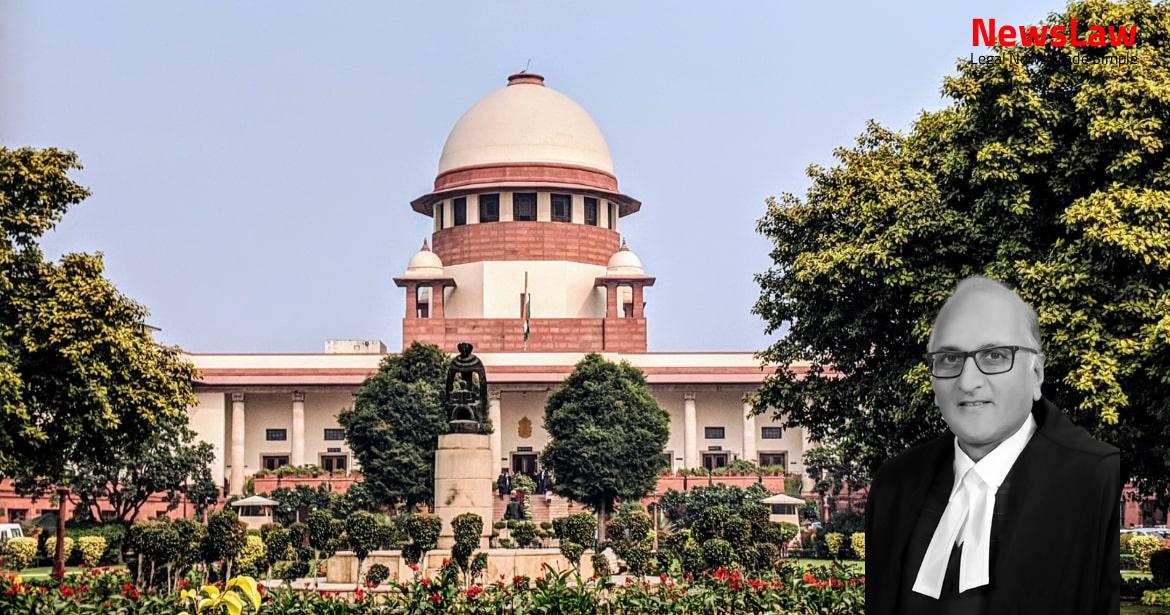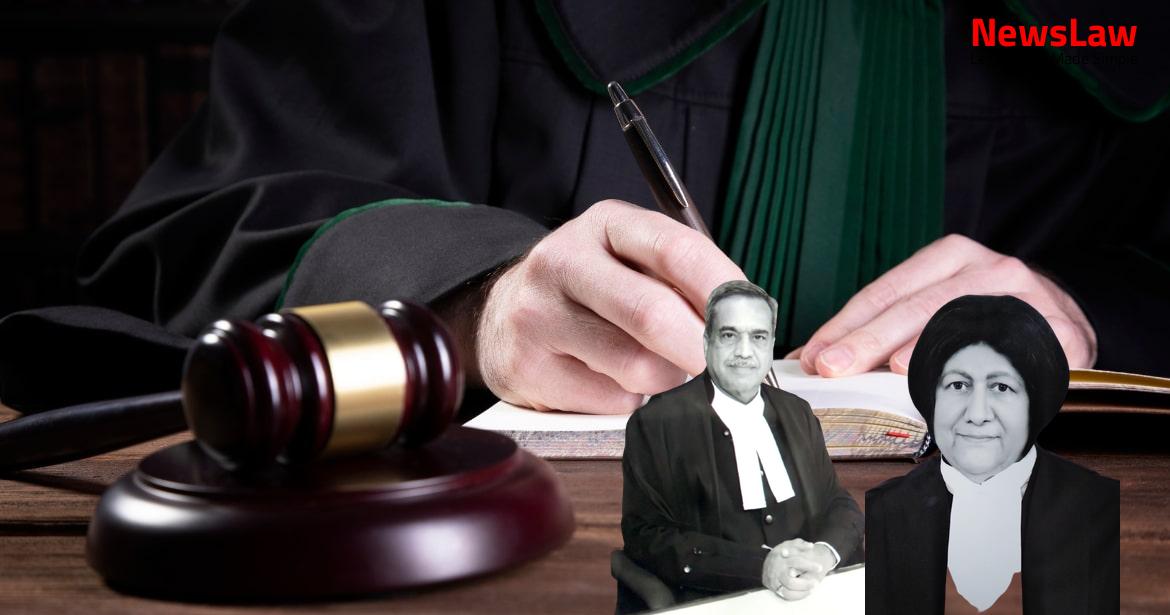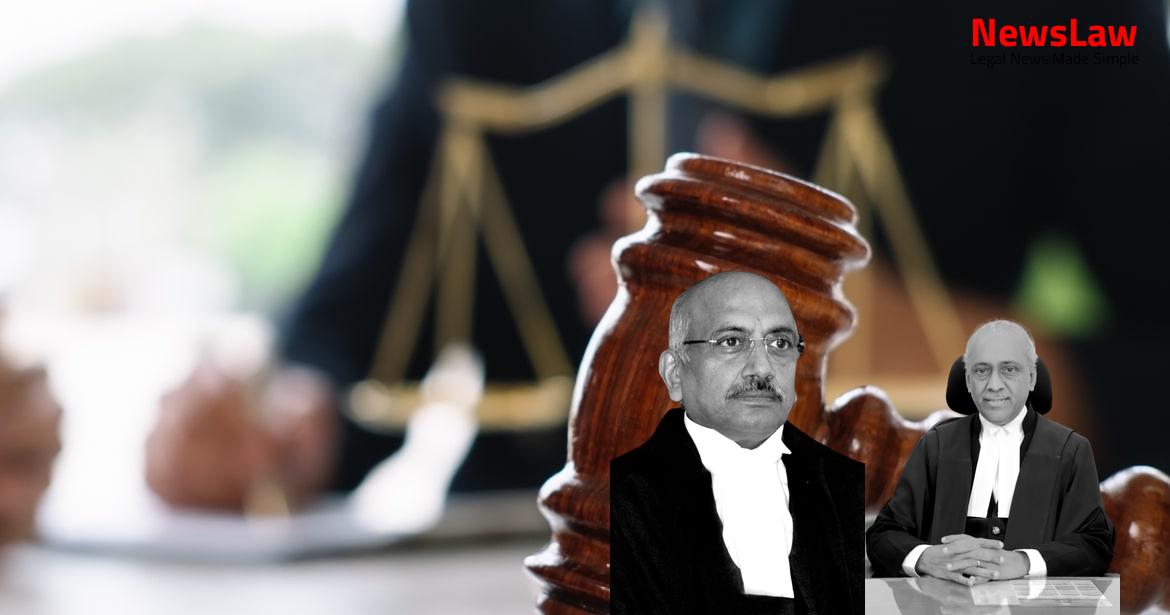The Supreme Court of India’s recent ruling on the legislative competence of state legislatures in rent control matters has significant implications. The case delves into the constitutional authority behind Section 13(2) of the Rent Control Act, addressing the powers and limitations of legal jurisdictions. This judgment sets a precedent for clarifying the boundaries of legislative powers in legal disputes, impacting the interpretation of laws governing tenancy and rent-related issues.
Facts
- Appeal is against eviction order of the Rent Control Authority
- Appeal is under Section 13(2) of the Chhattisgarh Rent Control Act, 2011
- Rent Control Tribunal at Raipur confirmed the eviction order
- Section 13(2) allows landlord and/or tenant to appeal against Rent Controller’s order
- Appeal should be filed in prescribed manner within prescribed time
- On 19.4.2017, the Advocate General for the State of Chhattisgarh was heard by another Bench of this Court.
- An order dated 18.4.2016 raised doubts on the appeal against the Rent Control Tribunal, questioning the legislative competence of the State of Chhattisgarh to provide for statutory appeals directly to the Supreme Court.
- The Bench directed notice to be issued to the Attorney General for India.
Also Read: Analysis of Evidence in an Attempted Murder Case
Issue
- Key issue: Whether Section 13(2) of the Rent Control Act is ultra vires the Constitution of India.
- To determine if the Chhattisgarh State legislature had the legislative competence to enact the provision.
- Evaluating if there is a lack of constitutional authority for the enactment of Section 13(2).
Also Read: Ownership Dispute in Motor Vehicle Insurance Case
Arguments
- Counsel argued that Article 138(2) of the Constitution allows the Supreme Court to have additional jurisdiction and powers through special agreement with the Governments of India and States.
- The President is bound to act on the advice of the Council of Ministers as per Article 74.
- In cases where a Bill may affect the powers of the High Court, the Governor can reserve it for the President’s consideration.
- The Attorney General stated that the President’s assent under Article 201 is similar to the principles discussed in a previous case, K.K. Poonacha.
- The Rent Control Act does not grant new jurisdiction to the Supreme Court.
- The State Legislature has the power to legislate on the High Court’s jurisdiction, subject to the President’s assent.
- Primary legislative competence regarding the Supreme Court lies with Parliament, not State Legislatures.
- Assent by the President aligns with the conditions set in Article 138(2) of the Constitution.
- Conditions of Article 138(2) and the Second proviso to Article 200 have been met for the Rent Control Act.
- The State Legislature can limit High Court appellate power by allowing direct appeals to the Supreme Court.
Also Read: Interpretation of Retirement Age in Government Service
Analysis
- The vires of an enactment are to be determined by looking at whether the legislation as a whole falls within the legislative competence of the Legislature under the Constitution or relevant entries in the Seventh Schedule.
- Ancillary matters are to be included within the legislative power conferred by a specific entry.
- Section 13(2) of the Rent Control Act, providing for direct appeal to the Supreme Court, exceeds the legislative power of the Chhattisgarh State Legislature.
- The language in different entries of the Constitution should be harmonized to avoid rendering any entry nugatory.
- Article 138(2) allows the Supreme Court to have further jurisdiction with respect to any matter if provided by Parliament and State Governments through special agreement.
- Parliament and State Legislatures derive their law-making power from Article 245(1) but are subject to the provisions of the Constitution.
- Exclusive powers of Parliament and State Legislatures are defined under Article 246 in relation to the Union List, State List, and Concurrent List.
- The Governor may need to reserve certain Bills for the President’s consideration if they derogate the powers of the High Court.
- The grant of assent by the Governor or President does not affect the legislative competence of the State Legislature.
- Article 323B empowers legislatures to enact laws for adjudication by Tribunals, including matters related to tenancy and rent.
- Chhattisgarh State Legislature was competent to enact the Rent Control Act for adjudication of disputes related to tenancy and rent.
- High Court’s power under Article 226/227 is a basic feature of the Constitution and cannot be abrogated by statutory enactment or constitutional amendment.
- A recent judgment declared Section 13(2) of the Rent Control Act ultra vires the Constitution and beyond the State Legislature’s powers.
- Tribunals under Articles 323A and 323B are subject to High Court’s writ jurisdiction, but appellate jurisdiction is not applicable when finality is given to a decision.
- Supreme Court entertains appeals under Article 136 for substantial questions of law or public importance.
- The State Legislature can enact laws affecting court jurisdiction except under Article 226/227, which are inviolable basic features of the Constitution.
- “L. Chandra Kumar” pertains to the power of the High Court under Articles 226/227 of the Constitution.
- “N. Natarajan vs B. K. Subba Rao” case emphasized that High Court’s power can be exercised despite provisions for appeal in the Constitution or any other law.
- Conclusiveness or finality given by a statute to court decisions cannot prevent the Supreme Court from exercising jurisdiction under Article 136.
- Presidential assent does not validate an enactment beyond State Legislature’s powers.
- State Legislature cannot enact laws affecting Supreme Court’s jurisdiction, except under specific Articles.
- High Courts exercise superintendence sparingly, intervening only in specific cases.
- Federal structure delineates specific legislative powers for Union and State Legislatures.
- Article 136 grants discretionary power to Supreme Court, not an inherent right of appeal.
- Judicial review by High Courts limited to specific legal errors and jurisprudential violations.
- State laws must adhere to Constitutional provisions, especially concerning jurisdiction and appellate powers.
- Entry 65 and Entry 46 restrict State Legislature’s jurisdiction concerning Courts, excluding Supreme Court.
- The State Legislature did not have the legislative competence to enact Section 13(2) of the Rent Control Act.
- The reasons discussed in the judgment point to this conclusion.
- The lack of legislative competence makes Section 13(2) of the Rent Control Act invalid.
- This decision is based on a thorough analysis of the relevant legal considerations.
Decision
- Section 13(2) of the Rent Control Act declared ultra vires the Constitution of India
- Section 13(2) of the Rent Control Act ruled null and void
- Section 13(2) of the Rent Control Act deemed of no effect
Case Title: RAJENDRA DIWAN Vs. PRADEEP KUMAR RANIBALA
Case Number: C.A. No.-003613-003613 / 2016



